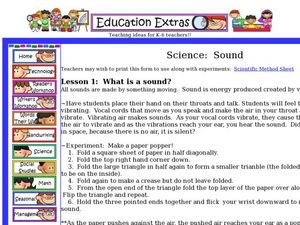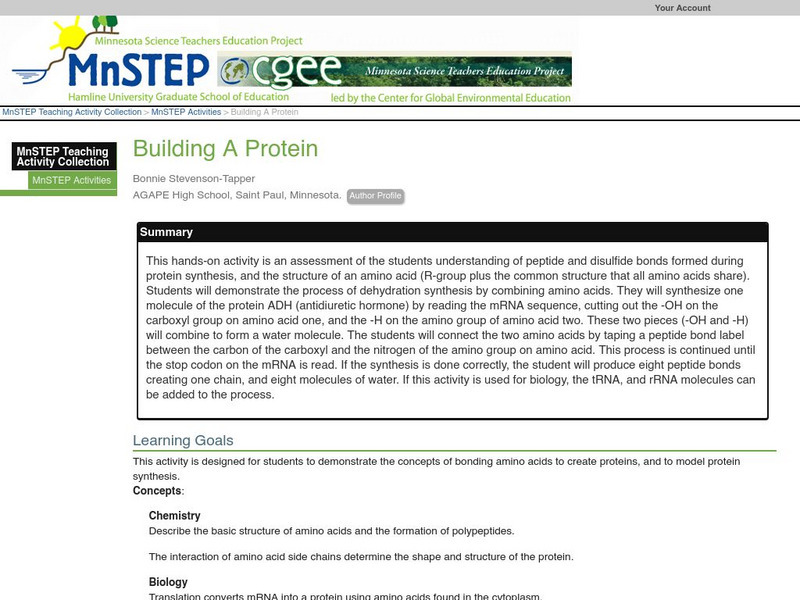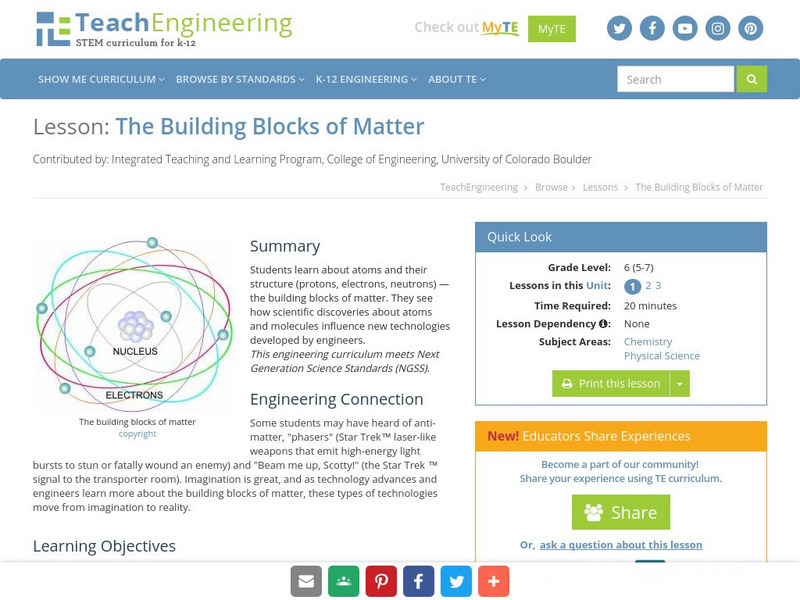Curated OER
Hierarchical Organization in Biology: Students Presentations of Neurobiology
Students gather (research) information on neuron structure and action potential. Students are guided to make inferences about the synapse and its relationship to neurotransmitter release and action. They are also guided to make...
Curated OER
Ozone Pollution: Smog Alert
Students examine factors the create smog. In this pollution instructional activity students complete an activity about ozone.
Curated OER
Resources for Teaching about Biogeochemical Cycles
Learners study the different cycles and Earth's systems. In this investigative lesson students study the nitrogen and carbon cycles, play a game pertaining to it and also participate in a class activity.
Curated OER
What is a Sound?
Second graders explore the concept of sound. In this sound lesson plan, 2nd graders discover what sound, vibrations, and pitch are through several experiments. Students watch a Power Point presentation that allows them to complete a...
Curated OER
A Model of a Scanning Tunneling Microscope
Ninth graders explain how a scanning tunneling microscope works. In this chemistry instructional activity, 9th graders construct atomic models and simulate how their images appear under the STM. They discuss the limitations of their...
Curated OER
A Lab Trilogy for Beginning Biology Teachers
Young scholars are able to explain their models to other students and to their parents. Then young scholars like to decorate the room by hanging the models or constructing mobiles of a number of models.
Curated OER
DNA Blueprint for Life
Students isolate DNA from different food sources. For this biology lesson, students research DNA extraction. They analyze DNA stands collected from the lab, and compare the differences between each.
Curated OER
DNA and RNA
Tenth graders research the history and discovery of DNA. Using their text, they label a basic DNA structure and the composition of genes. They explain how RNA and DNA differ from one other and discuss the processes of transcription and...
Curated OER
Science: What Happens to Create the Lode?
Young scholars understand how mineral deposits are formed and why they are not evenly dispersed. They create and describe three different precipitates from four solutions simulating mineral ore deposit formation in sedimentary rock.
Curated OER
Biology: Protein Study
Students in pairs, select and view proteins from the Protein Data Bank. After downloading the tutorial and instructions, they identify the protein's structures and primary biological functions. Then, students present their findings to...
Science Education Resource Center at Carleton College
Serc: Building a Protein
This hands-on activity is an assessment of the students understanding of peptide and disulfide bonds formed during protein synthesis, and the structure of an amino acid (R-group plus the common structure that all amino acids share)....
TeachEngineering
Teach Engineering: The Fundamental Building Blocks of Matter
This lesson plan explores the fundamentals of atoms and their structure. The building blocks of matter (protons, electrons, neutrons) are covered in detail. Students think about how atoms and molecules can influence new technologies...
American Chemical Society
Middle School Chemistry: Changing State: Evaporation
Students build a model of a water molecule and design an experiment to see if adding energy affects the rate of evaporation.
Alabama Learning Exchange
Alex: Mirror, Mirror, on the Wall
This instructional activity covers chiral molecules, which are important in carbohydrate and protein chemistry. Understanding the difference in their structures helps with understanding the different biochemical properties of molecules...
Other
Science Alive: What Is Synthesis?
This lesson describes chemical synthesis in terms of building or breaking down molecules and discusses the value of chemical synthesis. Students will have a chance to play an interactive game that is analogous to the process of chemical...
Utah STEM Foundation
Utah Stem Action Center: Salt Dissolved in Great Salt Lake
In this lesson, students will compare water from a fresh lake to water from the Great Salt Lake to begin to build a conceptual model for how salt dissolves in water. The lesson focuses on students using and developing models of molecules...













